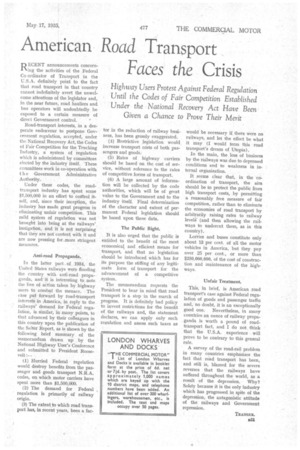American Road Transport Faces the Crisis D ECENT announcements concerning
Page 41

If you've noticed an error in this article please click here to report it so we can fix it.
the activities of the Federal Co-ordinator of Transport in the U.S.A. definitely point to the fact that road transport in that country cannot indefinitely avert the unwelcome attentions of the legislator and, in the near future, road hauliers and bus operators will undoubtedly, be exposed to a certain measure of direct Government control.
Road-transport interests, in a des.. perate endeavour to postpone Government regulation, accepted, under the National Recovery Act, the Codes of Fair Competition for the Trucking Industry, a system of regulation which is administered by committees elected by the industry itself. These committees work in co-operation with t ho 'Government Administrative Authority.
Under these codes, the roadtransport industry has spent some ffl,500,000 in an effort to control itself, and, since their inception, the industry has made great progress in eliminating unfair competition. This mild system of regulation was not brought into being at the railways' instigation, and it is not surprising that they are not content with it and are now pressing for more stringent measures.
Anti-road Propaganda.
In the latter part of 1934, the United States railways were flooding the country with anti-road propaganda, and it is interesting to note the line of action taken by highway users to combat the menace. The ease put forward by road-transport interests in America, in reply to the railways' demand for Federal regulation, is similar, in many points, to that advanced by their colleagues in this country upon the publication of the Salter Report, as is shown by the following brief summary of the memorandum drawn up by the National Highway User's Conference and submitted to President Roosevelt :—
(1) Hurried Federal regulation would destroy benefits from the passenger and goods transport N.R.A, codes, on which motor carriers have spent more than $1,500,0-00.
(2) The demand for Federal regulation is primarily of railway origin.
(3) The extent to which road transport has, in recent years, been a fac
tor in the reduction of railway business, has been grossly exaggerated.
(4) Restrictive legislation would increase transport costs of both passengers and goods: (5) Rates of highway carriers should be based on the cost of service, without reference to the rates of competitive forms of transport.
(6) A large amount of information will be collected by the code authorities, which will be of great value to the Government and to the industry itself. Final determination of the character and extent of permanent Federal legislation should be based upon these data.
The Public Right.
• It is also urged that the public is entitled to the benefit of the most economical and efficient means for transport, and that no legislation should be introduced which has for its purpose the stifling of any legitimate form of transport for the advancement of a competitive , system.
The memorandum requests the President to bear in mind that road transport is a step in the march of progress. It is definitely bad policy to invent restrictions for the benefit of the railways and, the statement declares, we can apply only such regulation and assess such taxes as would be necessary if there were no railways, and let the effect be what it may (I would term this road transport's dream of Utopia).
In the main, the ,loss of business by the railways was due to depressed conditions and to weakness in internal organization.
It seems clear that, in the cdordination of transport, the aim should be to protect the public from high transport costs, by permitting a. reasonably free measure of fair competition, rather than to eliminate the economies of road transport by arbitrarily raising rates to railway level " (and then allowing the railways to undercut them, as in this country).
Lorries and buses constitute only about 13 per cent, of all the motor vehicles in America, but they pay over 25 per cent., or more than $250,000,000, of the cost of construction and maintenance of the highways.
Unfair Treatment.
This, in brief, is American road transport's case against Federal regulation of goods and passenger traffic and, no doubt, it is an exceptionally good one,' Nevertheless, in many countries an ounce of railway propaganda is worth a pound of roadtransport fact, and I do not think that the U.S.A. experience will prove to be contrary to this general rule.
A survey of the road-rail problem in many countries emphasizes the fact that road transport has been, and still is, blamed for the severe reverses that the railways have suffered throughout the world, as a result of the depression. Why? Solely because it is the only industry which has progressed in spite of the depression, the antagonistic attitude of the railways and Government
repression.






















































































